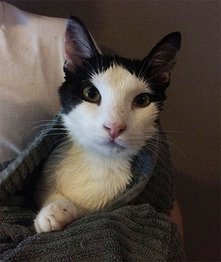
As cat owners everywhere can attest, their kitty cat companions are often happiest when engrossed in the satisfying “task” of self-grooming.
As a result, they are exceptionally clean and don’t require regular baths. Typically, they have little odor except, perhaps, for a subtle, warm fur smell, which is far from unpleasant.
Generally kitties dislike water, and some may be sensitive to the chemicals found in shampoos. And yet, there may be times when you MUST give your finicky feline a bath. Examples: if her coat has come into contact with a toxic substance; if she has rolled in something “suspicious”; if it’s a medical necessity, e.g. if she has ringworm or one of many, other skin conditions.
Even “geriatric” cats continue to groom although arthritis may make their joints stiff and sore, making them less efficient at grooming than they once were. Owners of seniors usually find regular brushing sufficient, but in some cases, their kitties’ genital region may not be adequately maintained, and a bath may be needed to keep that area scrupulously clean.
Hairless breeds like the Sphynx, Peterbald and Donsky have no fur to absorb the natural oils from their skin, causing their skin to become oily. Regular bathing – at least once a week – is therefore essential to remove that oil, thereby keeping them dry and clean. Daily rubdowns with soft cloths or pet wipes will both help to absorb some of the oil and encourage these cats to begin grooming on their own.
Anyone allergic to their kitty companions can also benefit from bathing them on a regular basis.
To bathe YOUR best furry friend, always use a shampoo specifically designed for use on cats. Some experts also recommend trimming her claws a day or two ahead of time – for both your sakes!
Fill your bathtub or a large laundry tub with approximately 6 inches of WARM water. Carefully wet your cat, apply the shampoo according to the instructions, taking care not to get any in her eyes (it’s wiser to wipe down her face with a dampened washcloth), then rinse her thoroughly with clean water.
Remove her from the bath and wrap her in a large, soft towel. Dry her well in a warm room or – if she’ll allow it -- use a hairdryer, taking great care to keep the heat from getting too near her skin. Never allow a freshly bathed and wet cat to go outside; always ensure she’s completely dry first.
A less traumatic way to give kitty a bath is by using bran to remove oil and dirt from her coat instead of water. Put 1/2 cup of bran in the microwave or oven (low heat) until it’s JUST warm (about body temperature). Place your cat in a large sink or bathtub and rub/massage the bran into her coat, going AGAINST the direction of the hair growth to ensure it gets UNDER her fur. Leave the bran in for 10 -15 minutes and then brush it out.









 RSS Feed
RSS Feed